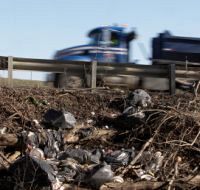

A convicted waste criminal from Leeds has been ordered to pay £1,373,060 for defrauding government-backed schemes worth millions in a Proceeds of Crime hearing at Leeds Crown Court.
Terry Soloman Dugbo who is currently serving seven years and six months in prison, the longest custodial sentence given for an environmental crime, was ordered to repay the money he made from his fraudulence or face an extra eight years in prison.
In 2016 Dugbo was found guilty of falsifying paperwork for his waste operations in Leeds, to claim money through government-based Producer Compliance Schemes for collecting and recycling nearly 20 thousand tonnes of household electrical waste in 2011. In reality, Dugbo's company never handled such amounts of waste described and he was not entitled to the substantial funds he claimed.
Mr Dugbo was not able to provide enough evidence to show what happened to the proceeds of his fraud. Only after an in-depth investigation carried out by the Environment Agency (EA) and HMRC, it was discovered that he had benefitted around £1,373,060.09 from his crimes and the money was deposited in several bank accounts in Nigeria, Senegal and Spain.
Mr Dugbo contested the Proceeds of Crime actions since his conviction in 2016. He tried to reduce the previous benefit of over £96,000 for convictions of VAT fraud in 2014 and exporting hazardous waste to Nigeria in 2011. During the current proceedings, it was heard that Mr Dugbo had misled courts by claiming his assets had already been used to satisfy both of the earlier court orders when in reality they had not.
The investigation revealed that the crimes allowed Mr Dugbo to live a lavish lifestyle, including expensive holiday trips, luxury vehicles and tailor-made suits. Dugbo claimed that he gambled away much of the assets he acquired during the fraud, which the court rejected as not true.
EA's waste team leader, Dr Paul Salter said: "Mr Dugbo has now been ordered to pay £1.3 million which is a significant confiscation order on top of the custodial sentence already handed out. It sends out a clear message to others who flout the law that waste crime does not pay.
"Waste crime undermines legitimate business and can have significant detrimental impacts on communities and the environment. This hearing demonstrates how seriously we take waste crime and we'll continue to take action against those operating outside of the law and the regulations. Not only do we use environmental law to prosecute those who abuse the environment, but we also use the Proceeds of Crime legislation to ensure that criminals are deprived of the benefits of their illegal activity."
For more information on this subject, see: